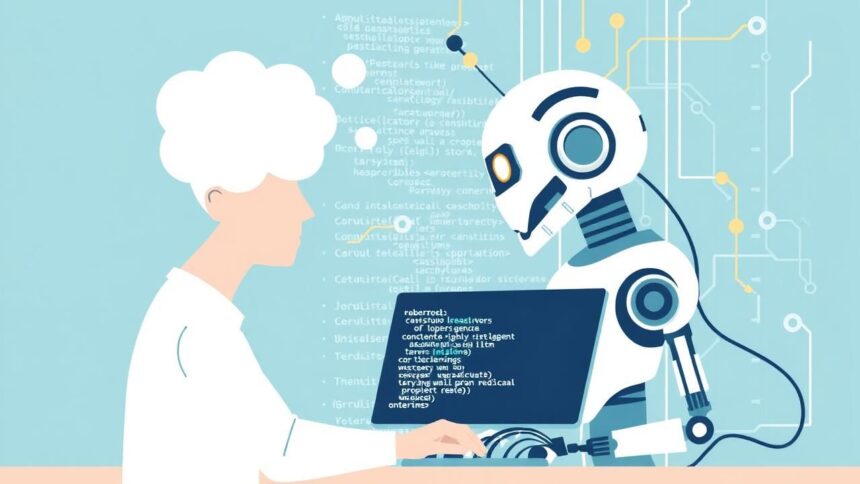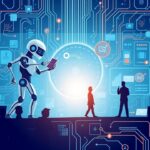Will AI Replace You? Understanding the Real Impact of Artificial Intelligence on Jobs
In today’s rapidly advancing world, artificial intelligence (AI) is becoming ubiquitous. From self-driving cars to personalized shopping recommendations, AI is transforming industries at an unprecedented pace. But with these advancements come concerns. Will AI take over your job? Should you be worried about being replaced? Let’s dive deep into the real impact of AI on jobs and see what the future holds.
1. Understanding Artificial Intelligence
1.1. What is AI?
Think of AI as the brain behind smart technologies. It refers to machines or software that can perform tasks that typically require human intelligence. These tasks include learning, reasoning, problem-solving, perception, and even language understanding. For instance, when you ask Siri for directions, you’re interacting with AI.
AI is not a single technology but a combination of several, including machine learning, natural language processing, and computer vision. Machine learning, in particular, allows AI systems to improve over time by learning from data, much like humans do.
1.2. How AI Works
AI systems work by using algorithms to analyze large amounts of data. These algorithms can identify patterns and make predictions based on the data they’ve been trained on. For example, Netflix uses AI to recommend movies you might like by analyzing your viewing history and comparing it with other users.
AI can also automate repetitive tasks, freeing up human workers to focus on more complex and creative activities. But how exactly does AI impact jobs? Let’s find out.
2. The Impact of AI on Jobs
2.1. Jobs at Risk
Some jobs are more susceptible to AI than others. According to a 2019 McKinsey report, up to 30% of hours worked globally could be automated with today’s technology. So, which jobs are most at risk?
- Repetitive and rule-based tasks are prime candidates for automation. Think about tasks like data entry, basic customer service inquiries, and assembly line work. These jobs can be streamlined by AI, reducing the need for human labor.
- Administration and support roles are also at risk. Tasks such as scheduling, booking appointments, and basic document handling can be automated to improve efficiency.
However, it’s not all doom and gloom. While some jobs may be eliminated, AI also creates new opportunities.
2.2. New Jobs Created by AI
The rise of AI will lead to the creation of new jobs, just as the industrial revolution did. While it’s impossible to predict every new role that will emerge, we can identify several trends that are already underway.
For example, as AI systems become more complex, there will be a greater demand for AI specialists. These professionals will be needed to develop, maintain, and improve AI technologies. This includes roles like AI developers, data scientists, and machine learning engineers.
Then there will be the jobs that focus on the human-AI interface. Customer service representatives who oversee AI-driven chatbots, or tech support professionals who ensure that AI systems are working correctly, are just a couple of examples.
- Ethical AI Specialists: As AI becomes more integrated into society, there will be a growing need for experts who can navigate the ethical implications of AI. These specialists will work to ensure that AI systems are fair, transparent, and respectful of privacy.
- AI Assisted Professionals: Many jobs will evolve to incorporate AI tools, creating hybrid roles. For instance, a doctor may use AI to analyze medical images, but still, need the human touch to diagnose and treat patients.
3. Preparing for an AI-Integrated Workforce
3.1. Skills Needed for the Future
To thrive in an AI-driven world, you’ll need to adapt your skills. The jobs of the future will require a combination of technical and soft skills. While AI can handle data analysis and routine tasks, it can’t match human creativity, empathy, and critical thinking. So, focus on developing these skills.
- Digital Literacy: Understanding how to use digital tools and technologies will be crucial. This includes everything from basic computer skills to proficiency in AI and machine learning.
- Data Analysis: Knowing how to interpret and analyze data will be invaluable. This skill will help you make informed decisions and identify trends, even as AI handles the heavy lifting.
- Critical Thinking and Problem-Solving: These skills will be more important than ever. You’ll need to be able to think outside the box and come up with innovative solutions to complex problems.
- Emotional Intelligence: Empathy, communication, and interpersonal skills will set you apart from AI. These qualities are essential for building relationships, resolving conflicts, and providing the human touch that AI can’t replicate.
But where do you start? Let’s look at some practical steps you can take to prepare for an AI-integrated workforce.
3.2. Continuous Learning and Adaptation
In a world where AI is constantly evolving, continuous learning is key. Don’t rely on what you know today—the technology and associated skills could be obsolete tomorrow. Stay curious and keep learning.
This can involve taking online courses, attending workshops, or earning certifications in relevant fields. Websites like Coursera, Udemy, and LinkedIn Learning offer a wealth of resources to help you stay ahead of the curve. Your employer might also offer training programs or tuition reimbursement for relevant courses.
Remember, change is constant, and so is growth. Embracing a mindset of lifelong learning will allow you to adapt to new technologies and thrive in an ever-evolving job market.
4. Success Stories: Thriving in an AI World
4.1. Real-World Examples
Let’s look at some success stories of people who have adapted to the rise of AI and found new opportunities.
Take the case of Adam Cheyer. He was one of the co-founders of Siri, the voice-activated virtual assistant. Before Siri, Cheyer worked on natural language processing and AI technologies. By staying ahead of the curve and focusing on cutting-edge technologies, he was able to transition into new roles as AI became more prevalent.
Then there’s Anne Wojcicki, the co-founder of 23andMe. When she started the company, the primary role involved collecting and analyzing genetic data. As AI has advanced, Wojcicki has embraced these technologies to provide more personalized and accurate genetic insights. By adapting her business model to include AI, she has stayed at the forefront of her industry.
4.2. Lessons Learned
These success stories teach us several valuable lessons. First, staying adaptable and open to new technologies is crucial. The world of work is changing rapidly, and those who can pivot and learn new skills will thrive.
Second, a focus on continuous learning and development pays off. Whether it’s through formal education, online courses, or on-the-job training, investing in your skills will help you stay competitive and relevant in an AI-driven world.
Lastly, embracing change and looking for new opportunities is essential. The rise of AI is not just about automation; it’s about innovation. By seeing AI as a tool for growth rather than a threat, you can unlock new possibilities and succeed in the future of work.
5. The Future of Work with AI
5.1. Coexistence and Collaboration
As AI continues to advance, it’s important to remember that it doesn’t have to replace human workers. Instead, AI can augment our abilities and create a more productive and efficient workforce. The future of work will likely involve a partnership between humans and AI, with each bringing their unique strengths to the table.
Imagine a scenario where AI handles the mundane, repetitive tasks, freeing up humans to focus on more creative and strategic work. This collaboration can lead to higher job satisfaction, increased productivity, and better outcomes for both employees and employers.
5.2. Ethical Considerations
As AI becomes more integrated into our lives, it’s crucial to consider the ethical implications. We must ensure that AI systems are designed to be fair, transparent, and accountable. This involves addressing issues like bias in AI algorithms, data privacy, and the responsible use of AI technologies.
Ethical AI specialists will play a key role in ensuring that these considerations are met. By working together, we can create a future where AI benefits everyone, regardless of race, gender, or socioeconomic status.
Moreover, governments and organizations need to work together to create policies that support ethical AI development and deployment. This includes regulations that protect workers’ rights and ensure that AI technologies are used for the betterment of society.
Conclusion
So, will artificial intelligence replace you? The short answer is: it depends. While some jobs will be automated, others will evolve, and new ones will be created. The key is to stay adaptable, keep learning, and focus on developing skills that AI can’t replicate.
Remember, AI is a tool that can augment our abilities and create new opportunities. By embracing this technology and working collaboratively with it, we can shape a future where humans and AI thrive together. Don’t let fear hold you back—see AI as an opportunity for growth and innovation.
As you navigate this rapidly changing landscape, stay curious, stay adaptable, and keep learning. The future of work is bright, and with the right mindset and skills, you can be a part of it.










